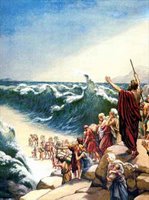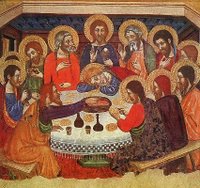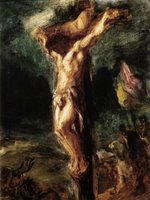Holy Week: The Passover of Our God
 We now stand in the heart of Holy Week. Maundy Thursday, Good Friday, Holy Saturday and the Vigil, and Easter Sunday lie ahead. These next few days are intimately and intricately connected with the Old Testament feast of the Passover. Back around A.D. 750, John of Damascus penned the hymn, The Day of Resurrection. It begins, “The day of resurrection, Earth, tell it out abroad, The Passover of gladness, The Passover of God. From death to life eternal, From this world to the sky, Our Christ has brought us over With hymns of victory.”
We now stand in the heart of Holy Week. Maundy Thursday, Good Friday, Holy Saturday and the Vigil, and Easter Sunday lie ahead. These next few days are intimately and intricately connected with the Old Testament feast of the Passover. Back around A.D. 750, John of Damascus penned the hymn, The Day of Resurrection. It begins, “The day of resurrection, Earth, tell it out abroad, The Passover of gladness, The Passover of God. From death to life eternal, From this world to the sky, Our Christ has brought us over With hymns of victory.”The Passover foreshadowed the events of Holy Week, exactly as God intended. The Son came to earth to assume human flesh and to live perfectly in the stead of imperfect humanity. He carried our weaknesses in himself, resisting temptation to depart from his chosen path. He came knowing not only that he would die on our behalf, but choosing so to do. His death came during the time of Passover in Judah, as the children of Abraham praised God for his deliverance of his people from Egypt, the land of bondage.
 As the Children of Israel remembered the lambs’ blood painted over their forefathers’ doors, the ultimate Passover Lamb prepared Himself for the slaughter. His blood would be painted over sinful humanity, and all who believed that the death of Jesus brought the final deliverance from their sins would become heirs of new life in His resurrection from the dead.
As the Children of Israel remembered the lambs’ blood painted over their forefathers’ doors, the ultimate Passover Lamb prepared Himself for the slaughter. His blood would be painted over sinful humanity, and all who believed that the death of Jesus brought the final deliverance from their sins would become heirs of new life in His resurrection from the dead.God established the Passover as the defining moment of His chosen people Israel. Through it, He called them out of slavery and into His family. Hundreds of years later, all of human history reached its defining moment as God used His Son to call people out of slavery to sin and into the family of Jesus Christ.
 The Passover observed at the time of Jesus looked back to the Angel of Death passing over the blood-stained doors of Israel. It remembered the Children of Israel passing over the Red Sea on dry land and the destruction of Pharaoh’s army. It recalled a faithful God’s promises to an often faithless people. The New Testament Passover of Christ’s death and resurrection looks back to Jesus’ death and resurrection and forward to our own resurrection and eternal life.
The Passover observed at the time of Jesus looked back to the Angel of Death passing over the blood-stained doors of Israel. It remembered the Children of Israel passing over the Red Sea on dry land and the destruction of Pharaoh’s army. It recalled a faithful God’s promises to an often faithless people. The New Testament Passover of Christ’s death and resurrection looks back to Jesus’ death and resurrection and forward to our own resurrection and eternal life.Christ passed over from life to death to life forevermore. As God used Moses with his staff, so on a far greater scale the Father used Jesus and His cross. Moses stretched out the staff in his arms to rescue God’s people from death on the shores of the sea. Jesus stretched out His arms on the cross to rescue all people from eternal death in hell. He leads the believers across death to life eternal in heaven. His Passover becomes ours. His resurrection is the guarantee that we too will rise to new life.
 The hymn continues: “Our hearts be pure from evil That we may see aright The Lord in rays eternal Of resurrection light And, list’ning to His accents, May hear, so calm and plain, His own ‘All hail!’ and hearing, May raise the victor strain.” The joy of knowing that Jesus is alive translates into the joy of knowing that we are alive. He cheers us on, telling us that we will make it safely to the other side.
The hymn continues: “Our hearts be pure from evil That we may see aright The Lord in rays eternal Of resurrection light And, list’ning to His accents, May hear, so calm and plain, His own ‘All hail!’ and hearing, May raise the victor strain.” The joy of knowing that Jesus is alive translates into the joy of knowing that we are alive. He cheers us on, telling us that we will make it safely to the other side.As we grow in the Faith, Easter takes its rightful place as the defining moment in our lives. Knowing better our sinfulness, we appreciate better our salvation. We need not fear death, grave, and decay: We will rise to live with our Savior forever. All sins, great and small, are washed away and Christ dresses us as kings and priests. God treats us as His dear children rather than as the illegitimate offspring of Satan.
 The ancient words of celebration become our own. John of Damascus’ hymn and others like it are our victory cheers until we join with the heavenly host in the unending celebration. “Now let the heav’ns be joyful, Let earth her song begin, Let all the world keep triumph And all that is therein. Let all things, seen and unseen, Their notes of gladness blend; For Christ the Lord hath risen — Our joy that hath no end.”
The ancient words of celebration become our own. John of Damascus’ hymn and others like it are our victory cheers until we join with the heavenly host in the unending celebration. “Now let the heav’ns be joyful, Let earth her song begin, Let all the world keep triumph And all that is therein. Let all things, seen and unseen, Their notes of gladness blend; For Christ the Lord hath risen — Our joy that hath no end.”God grant you full measure of that joy as you pass with His Son through this life and into life eternal, singing with all Christ’s Church our “hymns of victory.”
Visit LutheranHymnal.com for MIDI audio for The Day of Resurrection.
Send email to Ask the Pastor.
Walter Snyder is the pastor of Holy Cross Lutheran Church, Emma, Missouri and coauthor of the book What Do Lutherans Believe.
Technorati Tags: Passover | Holy Week | Maundy Thursday | Good Friday | Easter | crucifixion | resurrection

1 Comments:
Let us not forget that the Messiah is, as he said, the Bread from Heaven (John 6:51) in addition to being the (Passover) Lamb who takes away the sins of the world (John 1:29).
This is how Jesus gives us clear instruction on how to worship: "Jesus took some bread, and after a blessing, He broke it and gave it to the disciples, and said, 'Take, eat; this is My body.'" (Matthew 26:26; Mark 14:22; 1 Corinthians 11:23-25)
But we are not to take just any bread, but specifically unleavened bread, as at the Passover, which by the power of the Holy Spirit becomes the Bread of Life, Jesus himself, so that we may obey his command in John 6:51: "I am the living bread that came down from heaven; whoever eats this bread will live forever; and the bread that I will give is my flesh for the life of the world."
Hence our partaking of the Eucharist - the Bread of Life come down from Heaven - every Sunday to commemorate (literally be with him in) His passion, death, and resurrection as he instructed us. "As often as you shall do these things, in memory of me shall you do them." (1 Corinthians 11:25)
He is our Passover Lamb, and as the Old Covenant commanded that we celebrate the Passover as an everlasting memorial (that we are mystically there again at the deliverance from captivity in Egypt), the New Covenant commands that we continually celebrate (and are mystically there again) the Last Supper which began our deliverance from captivity to sin.
Thank you, God, for providing the Lamb (as you provided for Abraham and Isaac) to be the true Manna from Heaven, that we may eat your flesh, present to us in what once was bread but transubstantiated by the power of the Holy Spirit in your True Presence in the Eucharist. All praise, honor, and glory be Yours, Lord, now and forever. Amen.
Post a Comment
<< Home